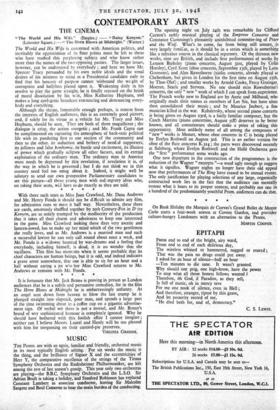MUSIC
THE Proms. are with us again, familiar and friendly, orchestral music in its most typically English setting. For six weeks the music is the thing, and the brilliance of Signor X and the eccentricities' of Herr Y, the comparative excellence of the strings of the Tirana Symphony Orchestra and the Rudesheimer Philharmoniker, are left among the rest of last season's gossip. This year only two orchestras are playing—the B.B.C. Symphony Orchestra and the L.S.O. Sir Adrian Boult is taking a holiday, and Stanford Robinson has replaced Constant Lambert as associate conductor, leaving Sir Malcolm Sargent and Basil Cameron to bear the main burden of the conducting. The opening night on July 24th was remarkable for Clifford Curzon's nobly musical playing of the Emperor Concerto and Constance Cummings's pleasantly uninhibited commere-mg of Peter and the Wolf. What's to come, far from being still unsure, is very largely familiar, as it should be in a series which is something like a refresher course in the classical repertory. Of the thirteen new works, nine are British, and include first performances of works by Lennox Berkeley (piano concerto, August 31st, played by Cohn Horsley), Cyril Scott (oboe concerto, September 13th, played by Leon Goossens), and Alan Rawsthorne (violin concerto, already played at Cheltenham, but given in London for the first time on August 25th, by Theo Olof) ; and smaller works by Arnold Cooke, Percy Grainger, Moeran, Searle and Stevens. No one should miss Rawsthorne's concerto, the only " new " work of which I can speak from experience. The French works new to England are by Auric and Milhaud, who originally made their names as members of Les Six, but have since then consolidated their music ; and by Maurice Jaubert, a fine musician killed in the war. Kabalevsky, whose second piano concerto is being given on August 23rd, is a fairly familiar composer, but the Czech Martinu (piano concertino, August 5th) deserves to be better known, and all connoisseurs should make a point of taking this opportunity. Most unlikely name of all among the composers of " new " works is Mozart, whose oboe concerto in C is being played by Evelyn Rothwell on August 3rd. This is an earlier version for oboe of the flute concerto K.314 ; the parts were discovered recently at Salzburg, where Evelyn Rothwell and the Halle Orchestra gave the " first " performance some weeks ago. One new departure in the construction of the programmes is the reduction of the Wagner " excerpts "—a word ugly enough to suggest what it signifies. Wagner nights no longer have their old appeal now that performances of The Ring have ceased to be annual events. The only justification for playing selections of any large, organically constructed work lies in the fact that the audience can mentally restore what it hears to its proper context, and probably not one in a hundred of the predominantly youthful Prom. audiences can do that.
* * * * On Bank Holiday the Marquis de Cuevas's Grand Ballet de Monte Carlo starts a four-week season at Covent Garden, and provides culture-hungry Londoners with an alternative to the Proms.
MARTIN COOPER.


































 Previous page
Previous page